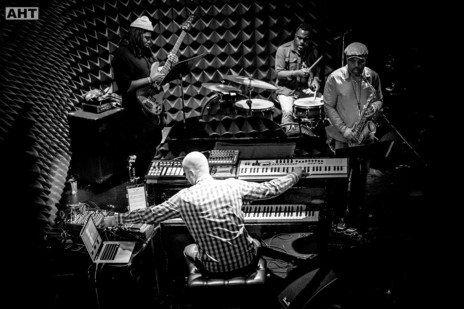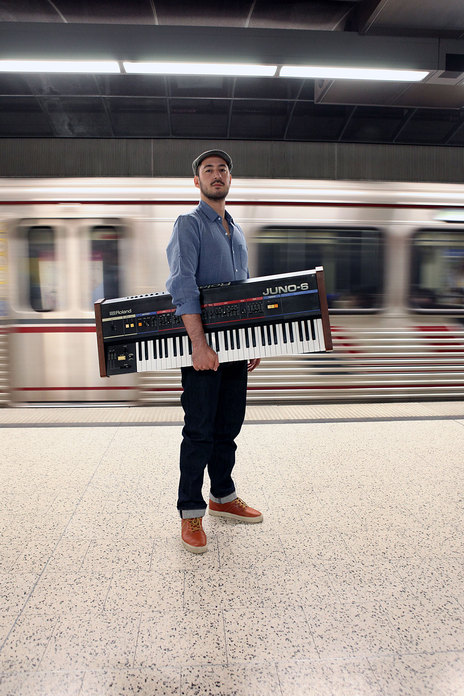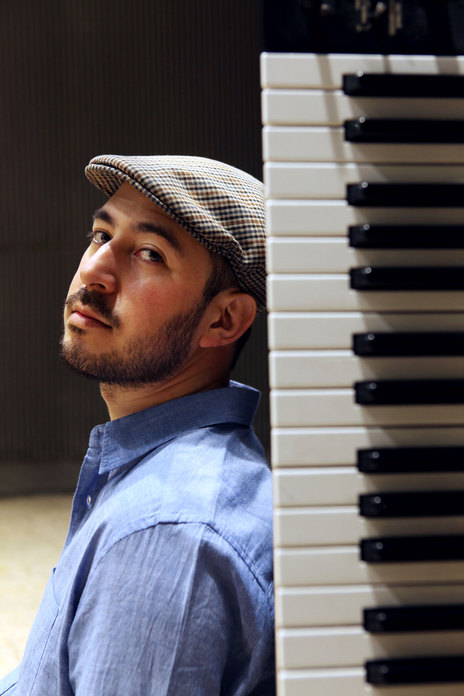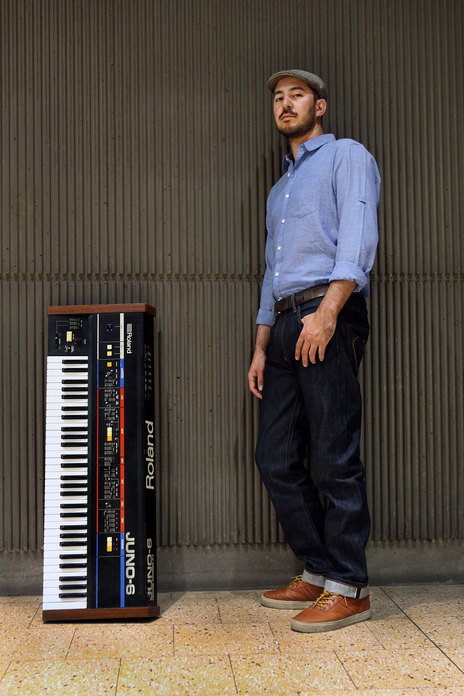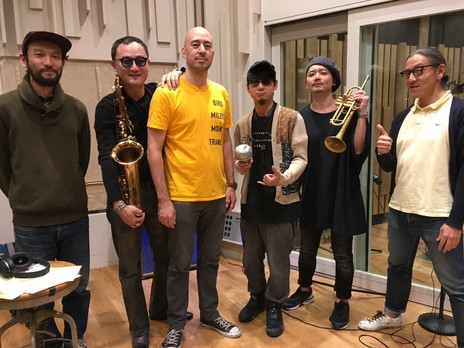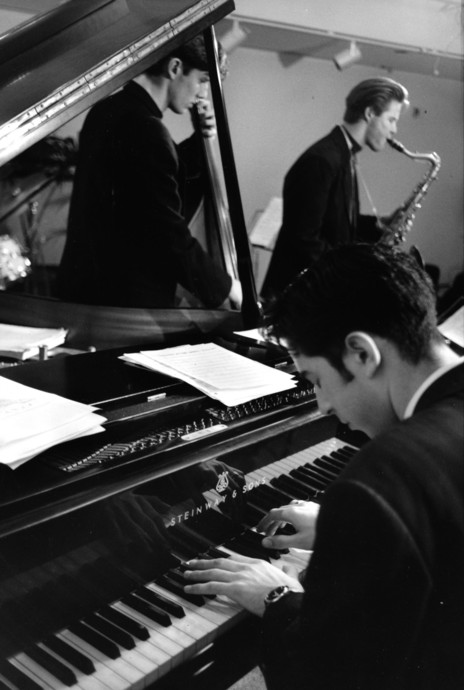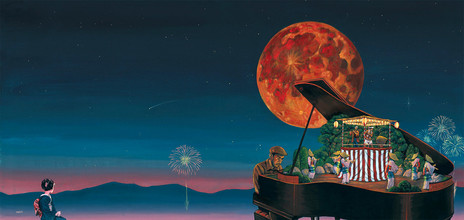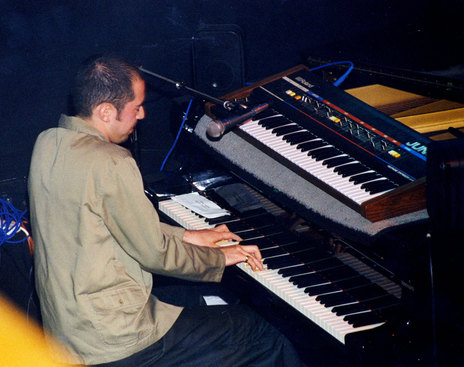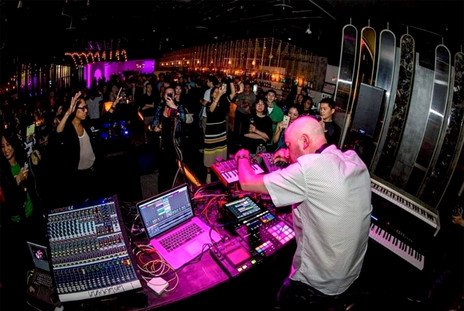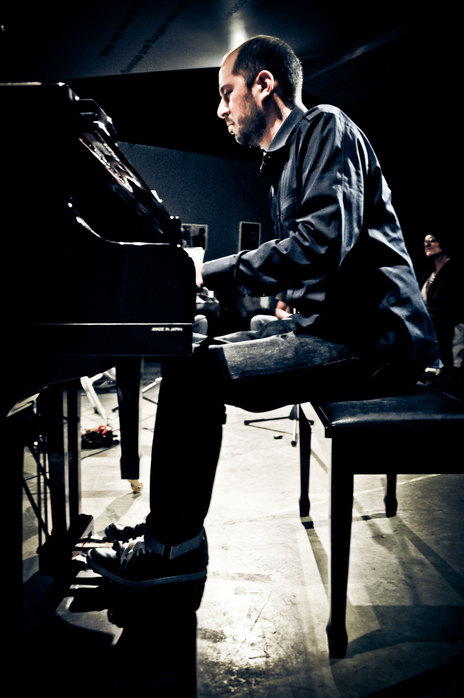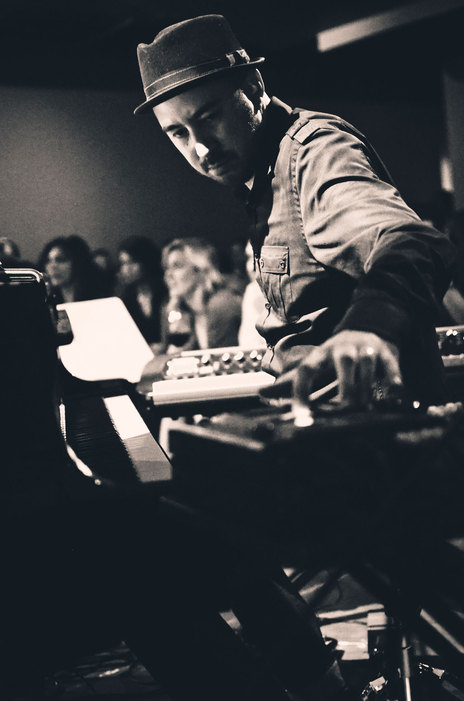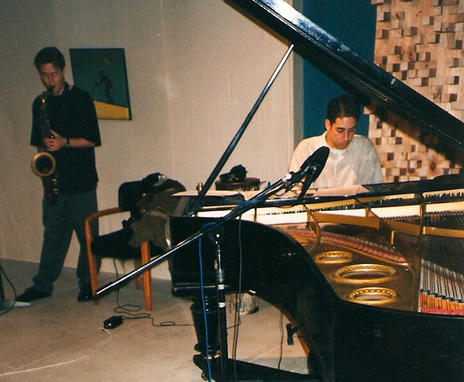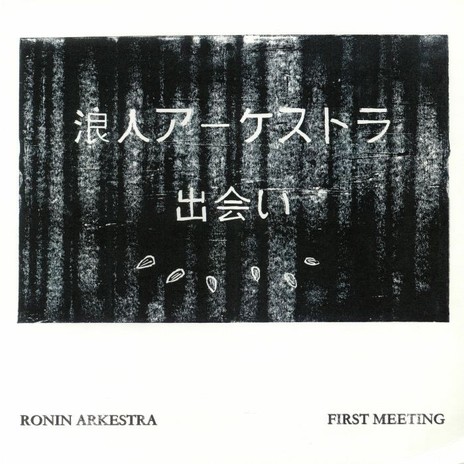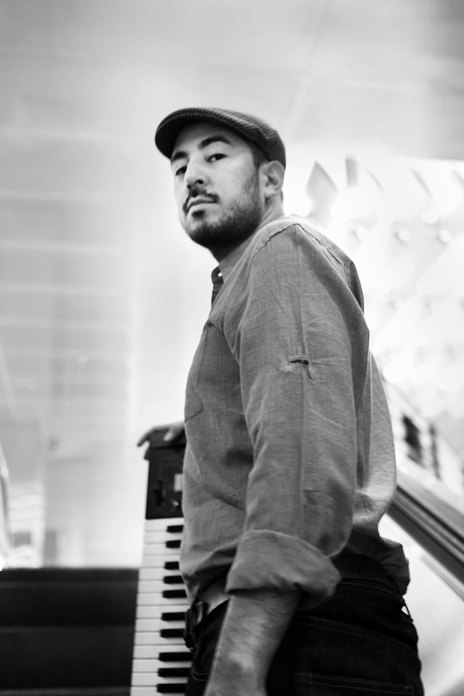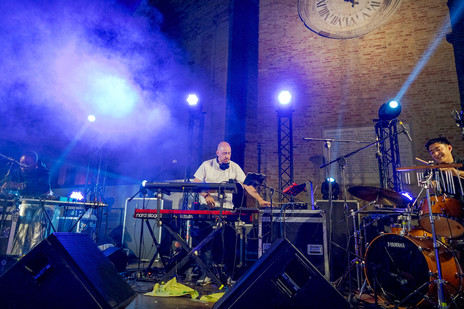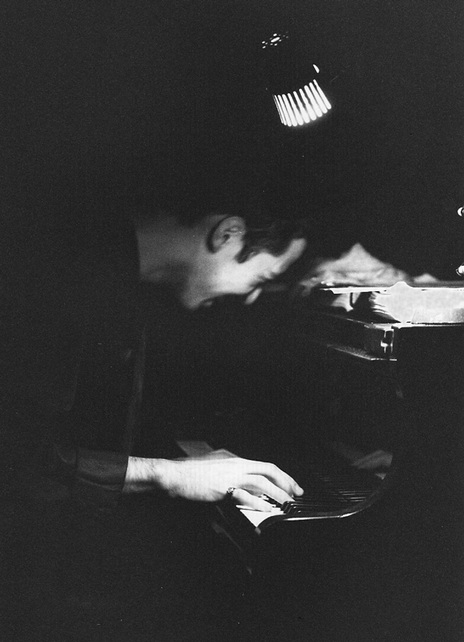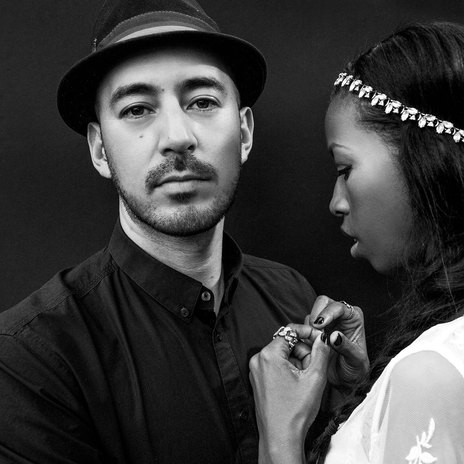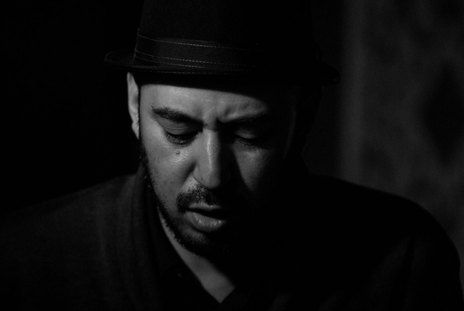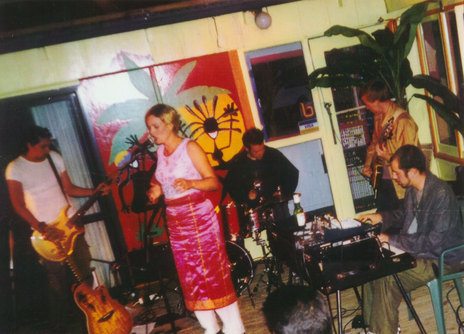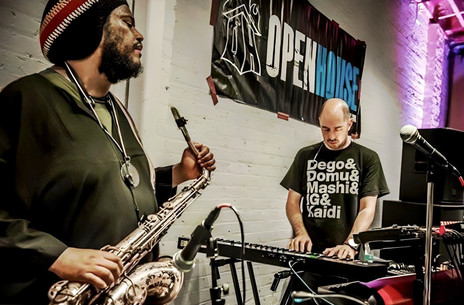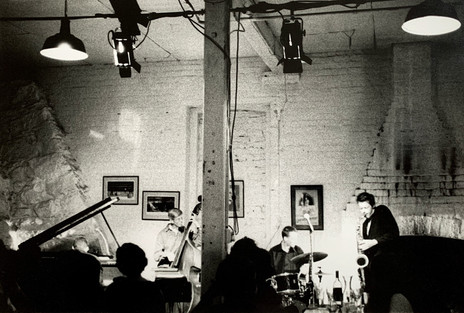He initially recorded for his own Tap Records which he co-owned with producer Andrew Dubber in Auckland, but has subsequently appeared on Loop and Kog, Columbia Japan, Universal Jazz, and Tru Thoughts in the UK.
Mark de Clive-Lowe always seemed like a young man in hurry, right from when he was playing Auckland clubs such as Cause Celebre and Manifesto Wine Cellar in the 1990s .
Born to Japanese and New Zealand parents, he started with piano lessons at four; his school friends included producer Andy Morton (aka Submariner), DJ Rob Salmon and Zane Lowe (onetime rapper in Auckland’s Breaks Co-Op, an influential DJ and VJ in London and now LA-based tastemaker for Apple’s Beats 1).
He might have been a young man in a hurry, but he was well connected too.
Jazz in the Present Tense created a scene around themselves.
Ever busy, the self-managed de Clive-Lowe – whom Andrew Dubber has said the word “hustler” was invented for – was in the quartet Jazz in the Present Tense in the early 90s. Their self-titled album on Tap (1996) included the American bassist Richard Hammond and drummer Steve Hass, who met de Clive-Lowe and Auckland saxophonist Jason Jones at Berklee College of Music in Boston when they all studied there.
Playing mostly standards and the occasional de Clive-Lowe original, Jazz in the Present Tense created a scene around themselves through constant gigging and taking themselves into high schools.
Then, at the fashionable nexus of taste and musical culture, Cause Celebre, de Clive-Lowe inherited Nathan Haines’ band the Enforcers when the saxophonist lit out for London. His first two albums on Tap were straight-ahead jazz records – First Thoughts (four de Clive-Lowe originals or co-writes among the 10 tracks) and Vision in 97 (six originals across 11 tracks) – with similarly gifted up-and-comers, including bassists Matt Penman and Cameron Undy, and drummer Nick McBride.
It was an exciting and highly competitive time for live jazz in the city as this new generation challenged the old guard, borrowed (if not stole) members from other bands and captured the interest of a younger, hip crowd in the clubs around High and Lorne Streets in Auckland’s central city.
De Clive-Lowe was in demand for session work – he played on the 1995 Ma-Ve-Elle hit ‘Freedom’, an R&B cut he co-wrote with producer Alan Jansson – and always in the background was hip-hop.
Down in the clubs there were DJs in the musical mix in rooms such as The Box, which was right next door to Cause Celebre, so the co-mingling of styles was almost inevitable. In his early 20s at the time, de Clive-Lowe was of the age and disposition for it.
As writer Peter McLennan has noted, “Then he discovered the Akai MPC sampler and his style shifted to a more contemporary form, aimed squarely at the dancefloor.”
This was a major break from standards and acoustic jazz for de Clive-Lowe and his 1999 album Six Degrees featured, among others, vocalists King Kapisi, Cherie Mathieson and Teremoana Rapley, with Manuel Bundy on turntables.
Co-produced with Andy Morton/Submariner, Bundy (by this time part of de Clive-Lowe’s live band) and Joost Langeveld, Six Degrees had assistance from the Kingsland-based electronica collective Kog Transmissions.
Kog would also release his innovative Nuvonesia album Island of Nuvonesia the following year: de Clive-Lowe, Bundy, vocalist Imon Star and Nick Gaffaney (later of Cairo Knife Fight) on live drums. The album was recorded in four hours at Radio New Zealand’s Helen Young Studio in Auckland.
Around the same time the widely acclaimed Six Degrees was picked up for worldwide release by Universal Jazz.
“[Six Degrees] was basically a reflection of my previous year of experiences going to London for the first time and being in Cuba, [with influences from] Jazzanova and St Germain and so on,” de Clive-Lowe told me in 2014.
The man in a hurry was clocking up an increasing reputation as a gifted player and innovator, but ever restless, he also found time to play on the sole album by the TV-created girl group TrueBliss.
By this time the wider world beckoned and he moved to London, hooking up with Haines and UK producer Phil Asher.
And then his story hit high speed in West London’s hip and happening scene. According to McLennan, he is credited “with evolving the style labelled ‘broken beat’ alongside the likes of 4Hero, IG Culture, Dego and Kaidi Tatham” and he “worked with a wealth of artists, such as Jody Watley, Nia Andrews, Sheila E, Lauryn Hill, Omar and Pino Palladino”. When playing live “he drew on his jazz background, as he improvises beats on the MPC, then played over them on keys, joined by guest vocalists and musicians.”
As de Clive-Lowe said in 2014, “The whole broken-beat scene was called ‘bruk’ often. It had a house music tempo but also syncopation. It wasn’t like a new rhythm or anything but that became significant in that genre”.
He started his own Antipodean label in the early 2000s and in 2003 it released the Melodius Beats Volume 1 album of remixes through Universal Music.
After a decade in London, de Clive-Lowe shifted base to Los Angeles in 2009.
De Clive-Lowe’s fourth album Tide’s Arising in 2005 appeared on Antipodean/ABB Soul and Columbia in Japan, a country where he has played since 1996 with a regular pick-up trio. “I wanted to prove myself as a producer on that and make an alternative urban soul record for that time, which I felt like I achieved.”
After a decade in London, de Clive-Lowe shifted base to Los Angeles in 2009 where he subsequently established club nights called CHURCH which would give their name to his 2014 album.
Before that however was Renegades (2011, through Tru Thoughts), a collaboration with The Rotterdam Jazz Orchestra on Take The Space Train (2013), club gigs, touring, and live shows around the globe.
Unexpectedly, he discovered he was known in South Africa when a few years ago he had a two-hour live show on television at prime time on a Friday night, uninterrupted by advertisements.
“That was crazy. There’s this Kwaito youth movement, a house movement, and it’s a musical house movement, it’s not some kind of techno thing. It is soulful and musical. Little did I know, I had a following down there.
“I guess a handful of DJs there were tastemakers and they played my music and people were ready for it, it was an amazing welcome.”
He has remixed live classic Blue Note tracks (for the album #bluenoteremixed Vol 1 in 2016) and early in 2017 he released a live EP recorded in a CHURCH night at the Blue Whale club in Los Angeles.
He considered the CHURCH album of 2014 a breakthrough for him personally and musically, not so much another change of direction but an assimilation of his various past styles into a coherent and interesting whole.
“It was funded by Kickstarter. I wanted to raise $17,000 and it went up to $20,000. It took a month and it was the hardest thing I’ve ever done. Very challenging but ultimately satisfying because people were saying, ‘We love what you do, we believe in you and we want to help you make this next statement.’
“And in creating it I didn’t feel I had to make it for a certain scene or label, it was, ‘Wow, I can make this for myself and these people who have shown me they want me to be myself.’ ”
For the ‘CHURCH’ album he went back to playing acoustic piano for the first time in a decade
For CHURCH, he went back to playing acoustic piano for the first time in a decade. “[Previously] the producer would say, ‘Let’s put piano on this track’ and I’d be, ‘Nah, I’ll play synths,’” said de Clive-Lowe in June 2014. (He was on a 48 hour visit home via gigs in Tokyo before returning to the USA to launch the album in LA and New York.)
“I was running away from the jazz tradition, from jazz as an idiom and I wanted to deconstruct what it was.
“I guess it was the opposite of what I was into, that was club music where every sound and note seemed functional and nothing was wasted. And in the best improvised music and jazz that is it too, but as a younger jazz musician I didn’t get that mentality. [Jazz] was just lots of notes for me.
“The irony was that I learned that idea, like Ahmad Jamal and the space concept that less-is-more, from playing with house people, not from jazz. But it’s ironic how that lesson came back to me.
“I got back into the idea of improvising because I did a show in Budapest in 2003 and on a drum machine all the beats are always prepared. But it was a long set and we did the encore in the set. Then the crowd wanted an encore.
“I was saying to the promoter I was too drunk or too tired or whatever to do an encore, but he made me do it. So I went on stage with the drum machine and I improvised a live electronic production. I was so nervous doing that, but when it happened it reminded me of the spontaneity and improvisational nature of jazz, and I could see how I could bring all that together. I had a jazz epiphany in Budapest with a drum machine!”
“I had a jazz epiphany in Budapest with a drum machine!”
Mark de Clive-Lowe has remixed for Tama Waipara, Recloose, Chico Hamilton, Shirley Horn, Jody Watley, Incognito and many others, has won praise from the likes of global tastemaker and UK producer Gilles Peterson of the Acid Jazz, Talkin’ Loud and Brownswood labels, appeared at festivals such as Montreal Jazz, North Sea Jazz, Uberjazz, Tokyo Crossover Jazz Festival and Montreux Jazz Atlanta, played with R&B/jazz singer Dwight Trible, and has New York trombone legend Robin Eubanks on CHURCH.
“The connection with him for me came through his brother Duane who plays trumpet on the record, and Robin was part of a collective that [expat New Zealand bassist] Matt Penman plays in. It was all roads lead to Robin,” said de Clive-Lowe on that flying visit back to Auckland.
“It is important for me to bring the music back here. As much as some people might say, ‘He was a Kiwi’ or whatever, that’s the flag I fly and that’s the perception of me internationally. It’s always, ‘You’re from New Zealand’ and that’s important to me.”
And the young man in a hurry is still busy, but also taking time to reflect on where he has been and what he might become.
“For a long time I was getting more into being a producer, especially in the UK, so I was into having guest vocalists. And in a way that was also part of running away from jazz.
“So what was great with this CHURCH record was to return to largely instrumental music and limit the vocals to a point where they stood out dynamically, because there are fewer of them and they are functional.
“But I get to have the music as the leader in telling the story. Melody and harmony create that as an engagement.
“All the other records – and there were a fair few of them – were experiments and attempts, you try things and they work or don’t work. But something has happened to me in the past couple of years which has lead me to this point and enabled me to find my voice.”
In March 2019, Mark's new Japanese based collective, Roñin Arkestra, released their debut EP, Chance Meeting.
--
Update, August 2023
The following year, he undertook another international collaboration by working with Italian musicians Andrea Lombardini (bass) and Tommaso Cappellato (drums) on the album Dreamweavers (2020).
However, de Clive-Lowe is never one to stick in a single mode and so he subsequently returned to producing work on his own (which possibly made sense during the pandemic years). He released three successive EPs – Midnight Snacks Vol.1, 2, and 3. These very much took a “beats and keyboards” approach, which was exemplified by ‘37,000 Feet’ (resulting in over 300k streams).
He also remixed ‘The Message Continues’ by British saxophonist/composer Nubya Garcia, which was even more successful online. His next work was another live album recorded at the Blue Whale – Freedom – Celebrating the Music of Pharoah Sanders (2022).
--
Update by Gareth Shute, October 2024
Clive-Lowe’s work had often drawn on collaborations with other artists and this was certainly true of Hotel San Claudio (2023) which documented a set of tunes that he had created with rapper/producer Shigeto and singer/producer Melanie Charles for a show in Italy (the album title was taken from the hotel where they stayed).
Yet one of the biggest influences over this time was Clive-Lowe’s interest in reconnecting with his Japanese side. He was engaged by a Los Angeles organisation called Grand Performances to put on a live performance of original music in 2017 and he worked with his band to create Mirai no Rekishi - History of the Future. This work led him to research his mother’s history and led to a pair of albums, Heritage (2019) and Heritage II (2019). He then formed a new group in Japan, Ronin Arkestra, then relocated to Tokyo. No doubt this new city will open up new inspirations for this restless musical traveller.
